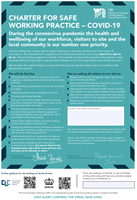Mon 18 May, 2020
Introduction
The home building industry, like other sectors, has been greatly impacted by the ongoing coronavirus pandemic.
Following the Prime Minister’s address to the nation on 23 March, many home builders took the decision to down tools while they took time to establish new ways of working safely and productively in accordance with social distancing guidelines.
Protecting the health and welfare of the home building workforce, supply chains, customers and local communities is the industry’s top priority which is why we have been working with developers and the Ministry of Housing, Communities and Local Government (MHCLG) to produce a Charter for Safe Working Practice. The Charter launched on the 13 May and contains a number of protocols enabling developers to deliver new homes while also protecting the health and safety of those on site. Further information can be found below.
We welcomed the Government’s decision to restart the housing market and the industry looks forward to playing a critical role in the UK’s economic recovery over the coming weeks and months.
This briefing is intended to provide you with examples of recent industry activities, the latest statistics from the home building industry, key industry challenges and information regarding current HBF policy work and campaigns.
We hope you find it useful but if you have any questions or would like to discuss the opportunities and challenges facing the homebuilding sector in more detail, please contact:
David O’Leary, Policy Director: david.oleary@hbf.co.uk, 0207 960 1612
Emma Ramell, Policy and Public Affairs Manager: emma.ramell@hbf.co.uk, 0207 960 1608
Jamie Allan, Policy and Public Affairs Assistant: jamie.allan@hbf.co.uk, 0207 960 1618
Further information can also be found on our website www.hbf.co.uk.
About HBF
The Home Builders Federation (HBF) is the representative body of the home building industry in England and Wales. Our members are responsible for providing around 80% of all new private homes built in England and Wales and most of our members are small or medium-sized enterprises.
Industry update
HBF launches Charter for Safe Working Practice to enable home building to resume safely
A Charter for Safe Working Practice has been launched by HBF in conjunction with the Ministry of Housing, Communities and Local Government (MHCLG) to support the safe return of home building during the ongoing coronavirus pandemic.
Through adherence to this Charter, the home building industry can continue to provide much needed additions to housing supply and play its part in the country’s economic recovery while delivering on its top priority: protecting the health and safety of the home building workforce, visitors to site and local communities.
While a number of HBF members have developed their own on-site safety protocols, the joint charter will support industry wide safe working practices. To date, the Charter has been signed by over 100 signatories including: developers, allied organisations such as NHBC and Openreach and a range of builders’ merchants.
It is intended that the Charter will be displayed on each home building site as a means of informing the general public that the Government has permitted construction activity to continue and that it is being undertaken in a safe manner. Contact details will also be included should a member of the public wish to raise any concerns or questions.
Further information about the Charter, which is aligned with both PHE guidance and the Construction Leadership Council’s Site Operating Procedures, can be found on our website. However, please do not hesitate to contact us should you wish to discuss this further.

Home building industry PPE appeal helps NHS and social care staff fight coronavirus
In response to reports of shortages in Personal Protective Equipment (PPE) for key NHS and social care staff on the frontline in the battle against coronavirus, HBF’s members have risen to the challenge and stepped in to support key workers through the provision of spare PPE during these challenging times.
Following the request for support from NHS and social care services, HBF sent out an appeal to its members and established a dedicated communications channel to help organise the coordination and delivery of much-needed equipment to health and social care providers.
House builders large and small have answered the appeal and have come forward to offer a range of equipment to hospitals from Dundee to Brighton including FPP3 respirator face masks, clinical aprons, surgical gloves, anti-fog glasses and various other types of critically important PPE. One HBF member donated their entire stock of 400 defibrillators from across its UK sites to help support St John’s Ambulance and St Andrew’s First Aid and provide ambulance and first aid workers with vital life-saving equipment.

HBF calls for brightest and best to meet the nation’s home building challenge
In a report published in February, HBF has highlighted the diverse workforce needed to enable the home building industry to meet the challenge of building 300,000 homes every year.
Building a Future: Opportunities in Home Building profiles individuals across a variety of roles in the sector, illustrating that people who want to work in home building have a myriad of options available to them and that there are opportunities for people of all backgrounds and talents to develop a rewarding career.
Stewart Baseley, HBF’s Executive Chairman, commented:
“With the publication of ‘Building a Future: Opportunities in Home Building’, HBF and our members are showcasing home building as an industry offering diverse, skilled and rewarding career opportunities.
“Our message is clear: Let’s get this country building, let’s build a future and let’s do it with a diverse workforce.”
Small home builders are struggling to access CBILS backed loans
Following a survey of its members, HBF remains concerned that smaller developers are struggling to access the Government’s Coronavirus Business Interruption Loan Scheme (CBILS).
While HBF represents home builders of all sizes, the majority of our membership consists of SME developers. Of these, around half would be eligible for a CBILS loan but at the time of writing only a handful had seen their applications progress. A number of barriers are preventing home builders from accessing CBILS, including:
- Only a quarter of the British Business Bank (BBB) accredited lenders have experience of lending to the real estate sector
- Small builders are unlikely to have a Revolving Credit Facility, meaning it is difficult for them to satisfy the security requirements needed for CBILS
- Some lenders that are equipped and experienced in the home building finance market have refused CBILS applications on a sectoral basis. Individual lenders appear to be taking different views on this question, even within the same institution. A number of reasons have been cited, including:
- An outright exclusion of real estate
- Making decisions based on a determination as to whether the lender would have lent to the developer prior to the coronavirus outbreak. Because this would typically have been on a project-by-project basis, lenders are determining that at a group level, they are unwilling to lend to builders
- An interpretation of BBB guidance for establishing viability being that ongoing cashflow is required by way of contracted income. Developers with inconsistent revenues dependent on making sales are therefore excluded
- Ineligibility for businesses that use Special Purpose Vehicles (SPVs) to deliver housing schemes – this is the primary route through which small home builders deliver new housing schemes
Home building has an important role to play in the economic recovery but in order for this to be realised, it is vital that smaller builders are able to access financial support to enable them to survive this difficult period.
We would welcome the opportunity to discuss our concerns with you in more detail. Please contact HBF’s Policy Director david.oleary@hbf.co.uk for further information.
Concern rises over build completion deadline for Help to Buy purchasers
Understandably, in order to ensure Help to Buy purchases are completed in the financial year for which funding for equity loans from government is allocated, the rules for Help to Buy require a transaction due for completion prior to 31 March to be build complete by the end of December. Over the course of the scheme’s operation, since 2013, this rule has been flexed to ensure that construction delays such as those caused by bad weather during winter months do not affect the prospects of the purchaser. Should delays be considerable there has previously been an opportunity to move the purchase from one financial year to another with no penalty for the buyer.
However, because of the planned transition from the current scheme to a new scheme next March with additional restrictions on buyer eligibility and regional price caps, a proportion of existing purchasers or the homes they are buying will no longer be eligible for the scheme. We estimate that around 40% of current or recent transactions completed with Help to Buy equity loans would no longer be eligible.
Due to the hiatus on construction sites during the second quarter of 2020 and the expected loss in production capacity on sites for the remainder of the year, it is extremely likely that many buyers of properties that were due for completion in the latter months of 2020 will no longer be able to access the scheme.
We hope that government will be able to share with current home purchasers news of additional flexibilities around this build completion date in due course. Otherwise, as well as damaging the prospects of many first-time buyers, we risk seeing housing output fall further than expected during the final quarter of 2020.

Help to Buy statistics published: 43,000 first-time buyers use the scheme to get onto the housing ladder in 2019
The Help to Buy Equity Loan Scheme is a key driver in reversing recent declines in home ownership levels amongst young people. Last year a total of 42,960 first-time buyers used interest free loans to purchase their first home.
Over the period since the launch of the Help to Buy: Equity Loan scheme (1 April 2013 to 30 December 2019), 263,297 properties were bought with an equity loan.
- 81% of purchases using Help to Buy have been bought by First Time Buyers (FTBs)
- To date, 83% of new homes bought with Help to Buy were for £350,000 or less
- The proportion of houses sold under the scheme on a leasehold basis has declined rapidly since 2017 – just 1.3% of houses sold under Help to Buy in Q4 2019 were on a leasehold basis.
If you would like information on how the current scheme is helping FTBs in your constituency, please do not hesitate to get in touch.
Home builders raise £110,000 to support construction charity through coronavirus
Home builders have raised £110,000 – doubling the funds already raised for the national family crisis fund appeal launched by the Lighthouse Construction Industry Charity.
The funds raised follow a similar donation last year by home builders of more than £120,000 to the Lighthouse charity as part of a campaign to provide financial and mental wellbeing support for workers in the industry.
The Lighthouse Construction Industry Charity, which supports the welfare and wellbeing of the construction industry’s workforce and their families, launched its national appeal to enable it to continue to provide financial and well-being lifelines to those in need after it was forced to cancel its fund-raising events.
As a result of the Coronavirus pandemic, calls to the charity’s confidential helpline have increased by 55% compared with last year. Many of these cases are from self-employed tradesmen, agency staff or workers on zero-hour contracts who are often only one or two paydays away from financial difficulties.





